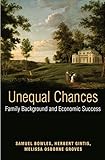Unequal Chances : Family Background and Economic Success / ed. by Herbert Gintis, Melissa Osborne Groves, Samuel Bowles.
Material type: TextPublisher: Princeton, NJ : Princeton University Press, [2009]Copyright date: ©2005Edition: Course BookDescription: 1 online resource (304 p.) : 18 line illus. 64 tablesContent type:
TextPublisher: Princeton, NJ : Princeton University Press, [2009]Copyright date: ©2005Edition: Course BookDescription: 1 online resource (304 p.) : 18 line illus. 64 tablesContent type: - 9780691136202
- 9781400835492
- Business
- Equality -- Congresses -- Psychological aspects
- Equality -- Psychological aspects -- Congresses
- Families -- Congresses -- Economic aspects
- Families -- Economic aspects -- Congresses
- Income distribution -- Congresses -- Social aspects
- Income distribution -- Social aspects -- Congresses
- Inheritance and succession -- Congresses -- Social aspects
- Inheritance and succession -- Social aspects -- Congresses
- Social mobility -- Congresses -- Psychological aspects
- Social mobility -- Psychological aspects -- Congresses
- Social status -- Congresses -- Psychological aspects
- Social status -- Psychological aspects -- Congresses
- SOCIAL SCIENCE / Social Classes & Economic Disparity
- online - DeGruyter
- Issued also in print.
| Item type | Current library | Call number | URL | Status | Notes | Barcode | |
|---|---|---|---|---|---|---|---|
 eBook
eBook
|
Biblioteca "Angelicum" Pont. Univ. S.Tommaso d'Aquino Nuvola online | online - DeGruyter (Browse shelf(Opens below)) | Online access | Not for loan (Accesso limitato) | Accesso per gli utenti autorizzati / Access for authorized users | (dgr)9781400835492 |
Frontmatter -- Contents -- Preface -- Introduction -- Chapter One. The Apple Does not Fall Far from the Tree -- Chapter Two. The Apple Falls even Closer to the Tree than We Thought -- Chapter Three. The Changing Effect of Family Background on the Incomes of American Adults -- Chapter Four. Influences of Nature and Nurture on Earnings Variation -- Chapter Five. Rags, Riches, and Race -- Chapter Six. Resemblance in Personality and Attitudes Between Parents and their Children -- Chapter Seven. Personality and the Intergenerational Transmission of Economic Status -- Chapter Eight. Son Preference, Marriage, and Intergenerational Transfer in Rural China -- Chapter Nine. Justice, Luck, and The Family -- References -- Index
restricted access online access with authorization star
http://purl.org/coar/access_right/c_16ec
Is the United States "the land of equal opportunity" or is the playing field tilted in favor of those whose parents are wealthy, well educated, and white? If family background is important in getting ahead, why? And if the processes that transmit economic status from parent to child are unfair, could public policy address the problem? Unequal Chances provides new answers to these questions by leading economists, sociologists, biologists, behavioral geneticists, and philosophers. New estimates show that intergenerational inequality in the United States is far greater than was previously thought. Moreover, while the inheritance of wealth and the better schooling typically enjoyed by the children of the well-to-do contribute to this process, these two standard explanations fail to explain the extent of intergenerational status transmission. The genetic inheritance of IQ is even less important. Instead, parent-offspring similarities in personality and behavior may play an important role. Race contributes to the process, and the intergenerational mobility patterns of African Americans and European Americans differ substantially. Following the editors' introduction are chapters by Greg Duncan, Ariel Kalil, Susan E. Mayer, Robin Tepper, and Monique R. Payne; Bhashkar Mazumder; David J. Harding, Christopher Jencks, Leonard M. Lopoo, and Susan E. Mayer; Anders Björklund, Markus Jäntti, and Gary Solon; Tom Hertz; John C. Loehlin; Melissa Osborne Groves; Marcus W. Feldman, Shuzhuo Li, Nan Li, Shripad Tuljapurkar, and Xiaoyi Jin; and Adam Swift.
Issued also in print.
Mode of access: Internet via World Wide Web.
In English.
Description based on online resource; title from PDF title page (publisher's Web site, viewed 30. Aug 2021)


